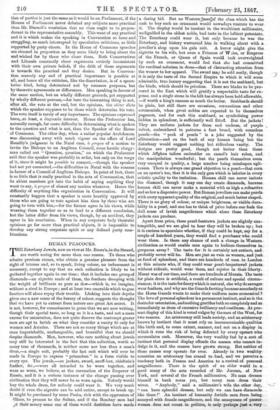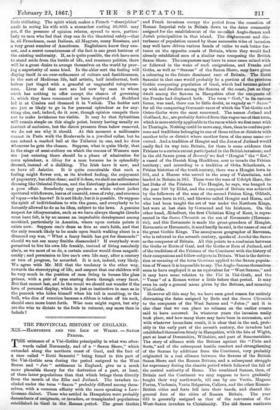HUMAN PEACQCI;S.
pE Esterhazy Jewels, now on view at Mr. Boore's, in the Strand, are worth seeing for more than one reason. To those who admire precious stones, who obtain a genuine pleasure from the sight of intense and, so to speak, living colour, no inducement is necessary, except to say that no such collection is likely to be gathered together again in our time ; that it includes one group of diamonds—an aigrette made of them, the feathers drooping with the weight of brilliants as pure as dew—which is, we imagine, without a rival in Europe ; and at least two emeralds which to gem fanciers will alone repay their trouble. Looking into their depths gives one a new sense of the luxury of colour, suggests the thought that we have yet to extract from nature one great Art secret. It is not, however, for connoisseurs- in gems that we are now writing, though their special taste, so long as it is a taste, and not a mere excuse for ostentation, does not quite deserve the contempt graver men are apt to lavish on what they consider a vanity fit only for women and Asiatics. There are not so many things which are at once imperishable, unchangeable, and beautiful that we should despise diamonds. Men, however, who care nothing about jewels may still be interested in the fact that this collection, worth so many tens of thousands, is neither more nor less than a man's drets,—a single suit, probably the last suit which will ever be made in Europe to express " princedom " in a form visible to every eye. The jewels,—on jackets, sword, snuff-box, chieftain's feather, &c.,—were all intended to be worn together, and were so worn, we believe, at the coronation of the Emperor of Russia, and it is a curious instance of the change passing over civilization that they will never be so worn again. Nobody would buy the whole dress, for nobody could wear it. We very much doubt if even the aigrette can be sold entire, except to break up. It might be purchased by some Pasha, rich with the oppression of
;Mons, to present to the Sultan, and if the Bombay men had
LA their money some one of them would doubtless have made a daring bid. But no WesternjmanT,of the class which has the cash to buy such an ornament would nowadays venture to wear. it. The display would be insolent in the wealthiest millionaire, undignified in the oldest noble, bad taste in the loftiest potentate. The Esterhazy could wear it, but only because he was the Esterhazy, and history warranted him in walking about with a jeweller's shop upon his gala suit. A buyer might give the aigrette to his wife, but even a Princess of W.des, or Empress of the French, or Queen of Spain would look overweighted by such an ornament, would feel that she had committed the cardinal solecism in dress—that of distracting attention from the wearer to her apparel. The sword may be sold easily, though it is only the taste of the Second Empire to which it will seem admirable, truediunny suggesting that it is not the scabbard, but the blade, which should be priceless. There are blades to be pro- cured in the East which will gratify a respectable taste for ex- pense, and a single stone in the hilt has always been held allowable, —if worth a king's ransom so much the better. Scabbards should be plain, but still there are occasions, coronations and other ceremonials, when great nobles are expected to be themselves pageants, and for such this scabbard, as symbolizing power hidden in splendour, is sufficiently well fitted. But the jackets ! They are uniform jackets for dress and undress, of purple velvet, embroidered in patterns a foot broad, with countless pearls—the "peck of pearls" is a joke suggested by the alliteration—and on the back of any human being but the Esterhazy would suggest nothing but ridiculous vanity. The designs are pretty good, though not better than those which Afghan tailors embroider on camel's hair robes, and the manipulation wonderful ; but the pearls themselves seem very unequal in quality, a large number being misshapen ugli- nesses. There is always one grand objection to a pearl—that corn on an oyster's toe, that it is the only gem which is inferior in every artistic quality to the imitation. Human skill can never imitate the diamond, though it may one day create diamonds, because human skill can never make a material with so high a refractive and so low a dispersive power. But Roman jewellers can make pearls with every apparent quality of the original, and much better shaped. There is no glory of colour, or unique brightness, or visible dura- bility in a pearl, and one.has to think of price before one feels the dull sense of lavish magnificence which alone these Esterhazy jackets can produce.
Apart from price, these pearl-bestrewn jackets are slightly con- temptible, and we are glad to hear they will be broken up ; but it is curious to speculate whether, if they could be kept, say for a couple of hundred years, they would find a purchaser who could wear them. Is there any chance of such a change in Western civilization as would enable men again to bedizen themselves in gorgeous array? The taste for it is certainly not extinct, and probably never will be Men are just as vain as women, and just as fond of -splendour, and there are hundreds of men. in London at this minute who, if they could wear pearl-bespattered jackets without ridicule, would, wear them, and rejoice in their liberty. Murat was of our time, and there are hundreds of Murata. The taste for plain dress is artificial, a result of culture and special circum- stances; it is the taste for finery which is natural, else why do savages wear feathers, and why are the Guards fretting because somebody at the Horse Guards wants to make their uniform more economical ? The love of personal splendour is a permanent instinct, and so is the desirefor ostentation, andnothing gratifies both so completely and so immediately as dress of excessive brilliancy and costliness. At pre- sent display of this kind is voted vulgar by the men of the West, for two reasons. An aristocracy still leads society, and an aristocracy knows by instinct that it must rely on incommunicable qualities like birth and, to some extent, manner, and not on a display in which it runs the risk of being defeated by every upstart who accumulates cash. Moreover, the very wealthy feel by a sort of instinct that personal display offends the masses who cannot in- dulge in it, and the masses have grown strong. But neither of these causes may operate for ever. Already in two wealthy countries an aristocracy has ceased to lead, and we perceive a tendency both. in France and America to a revival of personal magnificence. There is the spirit of an older world in a good many of the acts recorded of Mr. Jerome, of New York, and several of the French millionaires, No man dresses himself in bank notes yet, but many men dress their wives. "Anybody," said a millionaire's wife the other day, "can have splendid dresses, but only we can have diamonds like these 1" An instinct of humanity forbids men from being annoyed with female magnificence, and the annoyance of poorer women does not count in politics, is only perhaps just a very
little titillating. The spirit which makes a French " aharejobber" exult in seeing his wife with a stomacher costing 50,000/. may yet, if the pressure of opinion relaxes, spread to men, particu- larly to men who feel that they can do the theatrical safely—that is, all Frenchmen, most Italians, all Magyars, many Russians, and a very great number of Americans. Englishmen know they can- not, and a secret consciousness of the fact is one great buttress of the existing uniformity. If, as is quite possible, the rich have soon to stand aside from the battle of life, and renounce politics, there will be a great desire to avenge themselves on the world by prov- ing a superiority of some kind. In the abler sort the feeling will display itself in an over-refinement of culture and fastidiousness, in the sort of Medicean life, half artistic, half intellectual, both halves just tinged with a graceful or ungraceful voluptuous- ness. Lives of that sort are led now by men to whom earth has nothing to offer except the chance of governing it, which they have renounced or been deprived of. Beckford led it at Cimbra and dreamed it in V athek. The feebler sort are just as likely to go in for personal splendour as for any- thing else, and, indeed, do it now, though opinion compels them not to make lavishness too visible. It may be that Sybaritism -will remain simple on this single point, luxury having usually an instinct of seclusion, but the direct pressure from below removed, we do, not see why it should. At this moment a millionaire -cannot in Paris walk the Boulevards in a jewelled collar, but he can attend a masked ball at the Tuileries in one, and he does 'whenever he gets the chance. Suppose, what is quite likely, that in the stage of semi-culture on which the masses of Western men are - just entering there should be a phase of admiration for mere splendour, a liking for a man because he is splendidly dressed, instead, of a disliking. The Irish have it now, and -so have all Asiatics. It in quite conceivable that such a feeling might flower out, an its kindred feeling, the enjoyment -of pageantry, has often done; and if it does, we shall see millionaires dressing like Oriental Princes, and the Esterhazy jacket considered a poor affair. Somebody may produce a white velvet jacket ;spattered withflowers, leaves of emerald, roses of ruby, and crocuses of topaz—who knows? It is not likely, but it is possible. Or suppose the spirit of individualism to win the game, and everybody to be honestly allowed to do as he likes, subject to the laws. A genuine respect for idiosyncrasies, such as we have always thought Greeks must have felt, is by no means an improbable development among mankind, particularly in America, where upon certain points it oxists now. Suppose one's dress as free as one's faith, and that the only remark likely to be made upon Smith walking about in a diamond cap was, "What a fancy Smith has got for diamonds 1" -should we not see many Smiths diamonded ? If everybody were permitted to live his own life frankly, instead of living somebody else's, as we most of us do, a certain number would dress magnifi- oently ; and permission to live one's own life may, after a century -or two of progress, be accorded. It is not, indeed, very likely. 'We agree with Mr. Mill that the tendency is the other way, towards the stereotyping of life, and suspect that our children will be very much in the position of men living in houses like glass prisms, with a pair of eyes staring down through every facet. But that cannot last, and in the recoil we should not wonder if the bye of personal display, which is just as instinctive in man as in the peacock who hides himself when his tail is moulting, or the bull, who dies of vexation because a ribbon is taken off his neck, should once more burst forth. Wise men might regret, but why are the wise to dictate to the fools in raiment, any more than in beliefs ?































 Previous page
Previous page